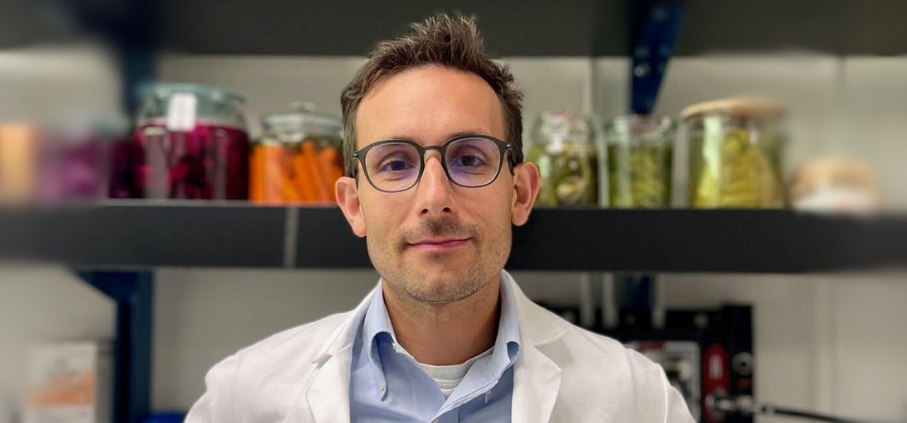Microbiome Expert Sean Spencer, MD, PhD: On a Mission to Prove that Food is Medicine

Sean Spencer, MD, PhD is a Gastroenterologist and Physician Scientist at Stanford University School of Medicine. Along with seeing patients in the clinic, Spencer conducts cutting-edge research on the microbiome in the Sonnenburg Lab. In his research, Spencer focuses on how nutrition affects the microbiome and the immune system, as well as how our diet can prevent and treat gastrointestinal disease and potentially increase longevity.
“There’s a clear association between the microbiome and healthy aging. Studies of centenarians show a different microbiome configuration and metabolite production compared to those with a shorter life span and unhealthy aging,” says Spencer. “The microbiome is a key aspect of lifestyle medicine because what we eat and how we exercise affects our microbiome composition.”
The Medical Path
Growing up amidst the rich agricultural tradition in Madison, Wisconsin, Spencer learned from an early age the importance of nutritious food for optimal health. As an undergraduate at the University of Wisconsin, Spencer majored in medical microbiology and immunology, and knew since his sophomore year that he wanted to practice medicine.
“After taking a human physiology course, I just knew that learning as much as I could about the human body and using that knowledge to help people was the only thing I wanted to do,” says Spencer. “As an undergrad, I also discovered that I could conduct research while caring for patients, and that clarified my career path further.”
These career goals prompted Spencer to pursue an MD-PhD program in immunology at the University of Pennsylvania, which he completed in 2015.
“In graduate school, I realized how our diet has a profound impact on the microbiome, and can directly influence the immune system,” says Spencer. “You want to think of the three aspects [nutrition, microbiome, and immune system] at the three corners of a triangle. They each impact the other.”
After completing an internal medicine residency at the Harvard-affiliated Massachusetts General Hospital, Spencer came to Stanford in 2017 for a fellowship in gastroenterology (GI).
“I came to Stanford specifically to work with Justin Sonnenburg, so it was great to be accepted to both the GI clinical program and his lab,” says Spencer. “What I love most about Stanford are the people and the creativity. This focus on the microbiome and nutrition is unique to Stanford and I’m glad to be part of a community that thinks about lifestyle medicine in both research and clinical care.”
Living His Dream
For the last three years, Spencer has been a practicing, board-certified GI physician at Stanford Medicine and a researcher in one of the most prestigious microbiome labs in the country. Spencer lights up when he talks about his current research on the small intestine microbiome:
“Most microbiome studies look at poop, which represents the very end of the GI tract, but the small intestine is 20 feet long, and researchers have sampled almost none of it,” says Spencer. “We’ve developed a novel technology to sample and investigate the microbiota [bacteria] of the small intestinal microbiome, which has been a huge blank space for the longest time.”
The small intestine is where many nutrients, including glucose, are absorbed into the bloodstream. Since high glucose levels are linked to diabetes and obesity, Spencer believes this research will potentially lead to the development of therapies to be used alongside lifestyle medicine, to enhance its benefits, for individuals with these medical conditions.
Spencer also studies hormones in the small intestine, such as Glucagon-like peptide-1 (GLP-1), which is the hormone targeted in the popular weight-loss drugs Ozempic and Wegovy. “The new GLP-1-targeted medications are powerful and amazing drugs, but it’s important to recognize that we have the power to regulate these hormonal pathways with our diet and lifestyle choices,” he says.
Although his work in the lab is a source of fulfillment, Spencer also enjoys bringing his research findings directly to his patients as a GI physician. Spencer is able to offer this bench-to-bedside level of care since he attained both a medical degree and a PhD in immunology.
“I’m most proud that I have the skillset to listen to patients and identify what they need clinically, and then do the research to fill in the gaps and conduct clinical trials to develop new therapies to help them,” says Spencer.
Looking to the Future
Spencer’s future plans are to work in a clinical setting where he can continue to see GI patients and perform clinical trials on nutrition-microbiome-immune research. Studies from the Sonnenburg lab he would like to continue are testing the anti-inflammatory effects of fermented foods, which help treat food allergies, and the mechanisms by which our diet, microbiome, and immune system impact each other.
Regarding patient care, Spencer takes a “food is medicine” approach and plans to conduct more research to back up that message. “My future goal is to perform research that reinforces the recommendations of lifestyle medicine; to build the evidence-base for types of food that promote a healthy microbiome and prevent and treat disease,” says Spencer. “This research will help us understand what aspects of food are critical for promoting health and wellness and has real potential to offer improved dietary advice and to help our patients promote health through what they eat.”








